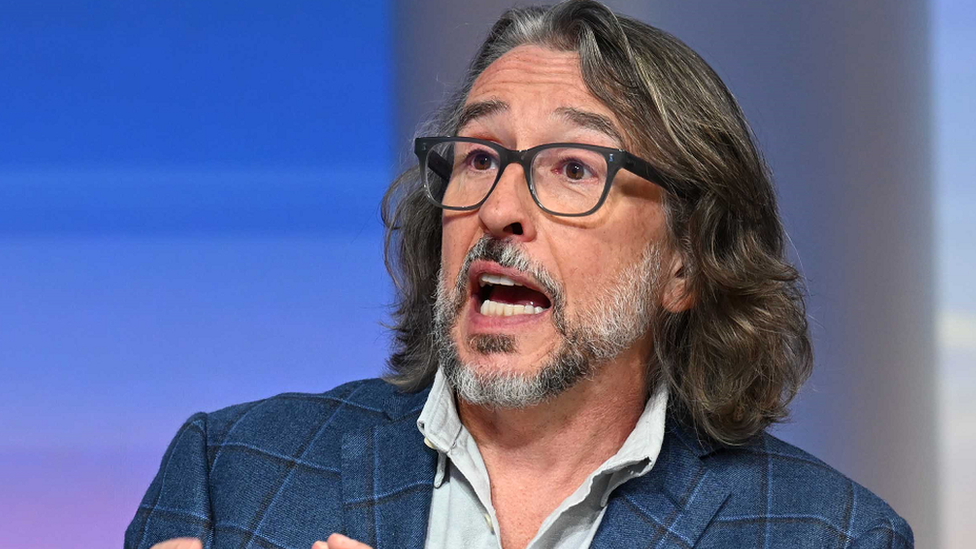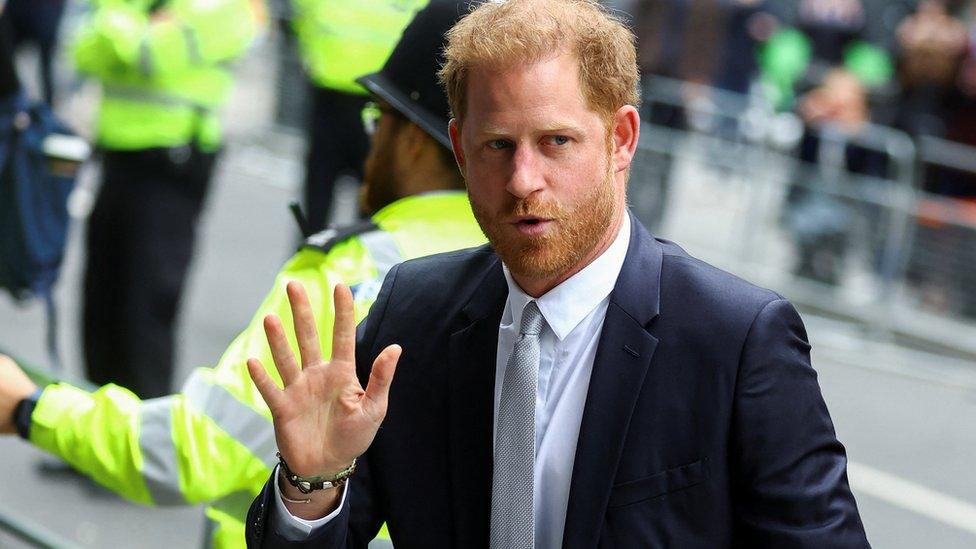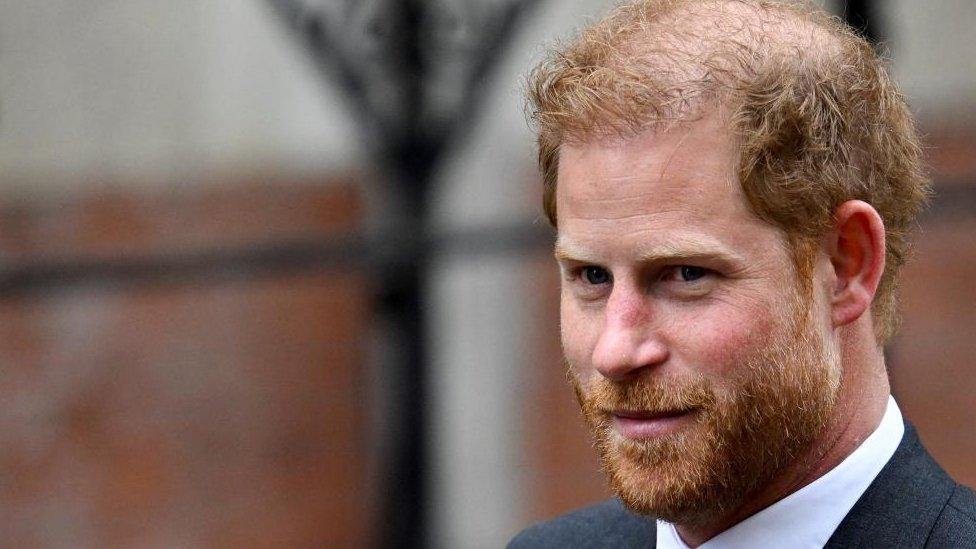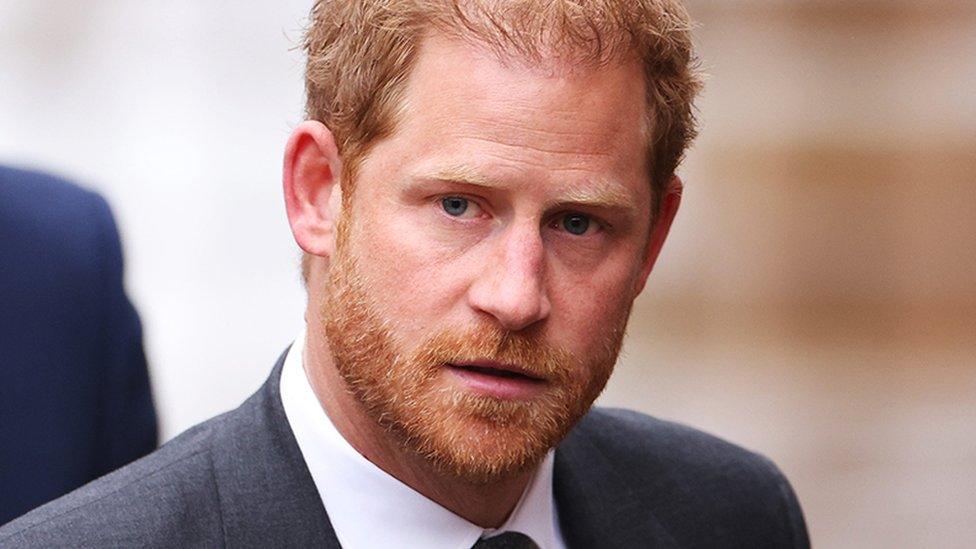Steve Coogan: Prince Harry's hacking case is 'start of something'
- Published

Steve Coogan has campaigned for increased press regulation
A High Court ruling that Prince Harry's phone had been hacked by Mirror Group Newspapers (MGN) is the "start of something", actor Steve Coogan said.
Coogan said the ruling exposed "widespread contempt" by newspaper editors for the Leveson Inquiry, which looked at the ethics of the press.
He said the press needed to be held accountable with "proper, independent regulation".
Coogan was a victim of phone hacking by MGN and settled with the group in 2017.
The actor and comedian has long been an outspoken critic of sections of the tabloid press.
Prince Harry, the Duke of Sussex, won in relation to 15 articles published by MGN, with the judge finding evidence of "widespread and habitual" use of phone hacking at the group's newspapers.
Coogan told BBC Radio 4's Today programme: "What this shows is the contempt that newspaper editors had for a judge-led public inquiry.
"Now we've got prima facia evidence of crimes having been committed, perjury being one of the most serious.
"The police need to apply the law evenly and fairly, without fear or favour. It doesn't matter how much time has passed."
Following the High Court ruling on Friday, Prince Harry called on the police and prosecuting authorities to "investigate bringing charges against the company and those who have broken the law".
The Metropolitan Police said it would "carefully consider the civil judgment" but added that there was "no ongoing investigation".
Coogan told the BBC the second part of the Leveson Inquiry, which was officially abandoned by the Conservative government in 2017, should now take place.
He said he would like to know what Labour leader Sir Keir Starmer would do about it if he became prime minister.
"Is he going to fold like a deckchair as previous, mostly Conservative prime ministers, have?" he asked.
The Leveson Inquiry was established under then-Prime Minister David Cameron following the phone-hacking scandal at News International. The second stage was meant to look into the relationship between journalists and the police.
The inquiry found politicians and the press had been too close, and that a new self-regulated body independent of serving editors, government and business should be established.
It concluded that a legal framework was needed to underpin the body. The industry rejected this, arguing the move would give politicians too much power.
The current regulator, the Independent Press Standards Organisation (Ipso), was set up in 2014 as successor to the Press Complaints Commission, which was criticised for its lack of action in the phone-hacking scandal.
Coogan told the BBC a new regulatory body was needed, claiming Ipso was "run by the press, for the press".
"What we need to see is proper, independent regulation, not run by the press, not run by the government, but independent voices," he added.
But Sir Alan Moses, former chair of Ipso, told the Today programme it was "ridiculous" to regard the regulator as "controlled or toothless".
"It's not run by the press, it's run by independent people with whom I worked," he said.
Ipso is paid for by its members through the Regulatory Funding Company, and has come under criticism from the Hacked Off campaign group - which Coogan is affiliated with - as being "owned and controlled by the very newspapers it is supposed to regulate".

Prince Harry became the first senior member of the Royal Family to testify in court since the late 19th century
The judge in the case found that editors and executives at MGN knew of phone hacking, and accepted evidence that that group included former Daily Mirror editor Piers Morgan.
Mr Morgan has repeatedly denied involvement in phone hacking and delivered a further statement about it outside his home hours after Friday's ruling.
"There is just one article relating to the prince published in The Daily Mirror during my entire nine-year tenure as editor that he [the High Court judge] thinks may have involved some unlawful information gathering," he said.
"To be clear, I had then and still have zero knowledge of how that particular story was gathered."
As well as taking aim at the prince among others, Mr Morgan denied personally hacking a phone or ordering someone to, and said "nobody has produced any actual evidence to prove that I did".
But Coogan said that nobody had accused Mr Morgan of this, and that Mr Morgan's statement did not address the judge's comments.
"Piers Morgan could have quite easily received illegally gained information whilst he was editor of the Mirror, used that knowing it was illegally gathered, and still be able to claim that he hadn't instructed anyone to hack anyone's phone or he personally hadn't hacked anyone's phone," Coogan told the BBC.
The BBC has approached Mr Morgan for further comment.
- Published15 December 2023

- Published15 December 2023

- Published15 December 2023